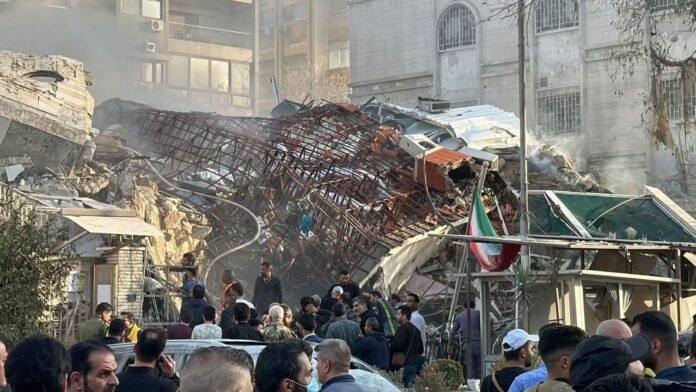Iran issued a stern warning to its longstanding adversary, Israel, following an air strike that resulted in the deaths of seven members of the Islamic Revolutionary Guard Corps (IRGC), including two high-ranking generals, and the destruction of its consular annex building in the Syrian capital. The deadly attack, which took place on Tuesday, has heightened tensions between the two nations and raised concerns about the potential for further escalation in the volatile region.
The Iranian government wasted no time in condemning the air strike, labeling it as a blatant act of aggression and vowing to retaliate against Israel for its actions. In a statement issued shortly after the attack, Iranian officials expressed outrage over the loss of life and vowed to hold Israel accountable for its actions.
The targeted strike, which targeted the Iranian consular annex in Damascus, Syria, represents a significant escalation in the ongoing conflict between Iran and Israel. The IRGC, a powerful paramilitary organization with close ties to the Iranian government, plays a central role in Iran’s regional activities and has been involved in supporting various proxy groups across the Middle East.
The deaths of two IRGC generals in the air strike underscore the severity of the attack and the potential implications for Iran’s military leadership. The loss of senior commanders is likely to have significant repercussions for Iran’s military capabilities and strategic planning, further exacerbating tensions between Iran and Israel.
Israel, for its part, has neither confirmed nor denied its involvement in the air strike, maintaining a policy of ambiguity regarding its military actions in the region. However, Israeli officials have long expressed concerns about Iran’s expanding influence in Syria and have vowed to take action to counter what they perceive as a threat to Israel’s security.
The air strike comes amid heightened tensions between Iran and Israel, fueled by a series of recent incidents and provocations in the region. Both countries have engaged in tit-for-tat attacks and covert operations against each other’s interests, raising fears of a wider conflict that could engulf the entire Middle East.
The Iranian government’s vow to retaliate against Israel for the deadly air strike has raised concerns about the potential for further violence and instability in the region. Iran has a history of supporting militant groups and proxies across the Middle East, raising the possibility of retaliatory attacks against Israeli interests in the region and beyond.
The international community has called for restraint and de-escalation in the wake of the deadly air strike, urging both Iran and Israel to refrain from further provocations and to seek diplomatic solutions to their differences. However, the deep-seated animosity and longstanding rivalry between the two nations make the prospect of a peaceful resolution increasingly elusive.
The air strike on the Iranian consular annex in Damascus represents a significant escalation in the ongoing conflict between Iran and Israel, which has been characterized by a series of covert operations, cyberattacks, and proxy confrontations in recent years. Both countries have engaged in a shadow war across the region, with Syria serving as a key battleground for their competing interests.
Iran’s presence in Syria, where it provides support to the Assad regime and various proxy militias, has long been a source of concern for Israel. Israeli officials have repeatedly warned against Iran’s attempts to establish a permanent military presence in Syria and have taken action to prevent the transfer of advanced weapons to Hezbollah, a Lebanese militant group backed by Iran.
The deadly air strike on the Iranian consular annex underscores the strategic importance of Syria in the broader geopolitical rivalry between Iran and Israel. The conflict in Syria has become a proxy battleground for regional powers, with Iran and Israel vying for influence and control over the war-torn country.
In response to the air strike, Iran has vowed to retaliate against Israel, raising the specter of further violence and instability in the region. The Iranian government’s determination to punish Israel for the attack underscores the depth of animosity between the two nations and the potential for the conflict to escalate into a wider conflagration.
The international community has expressed concern over the escalating tensions between Iran and Israel and has called for restraint and de-escalation. The United Nations and other diplomatic actors have urged both parties to exercise maximum restraint and to refrain from actions that could further exacerbate the situation.
Efforts to defuse tensions and promote dialogue between Iran and Israel are urgently needed to prevent the situation from spiraling out of control. Diplomatic channels must remain open to facilitate communication and mitigate the risk of miscalculation or unintended escalation.

